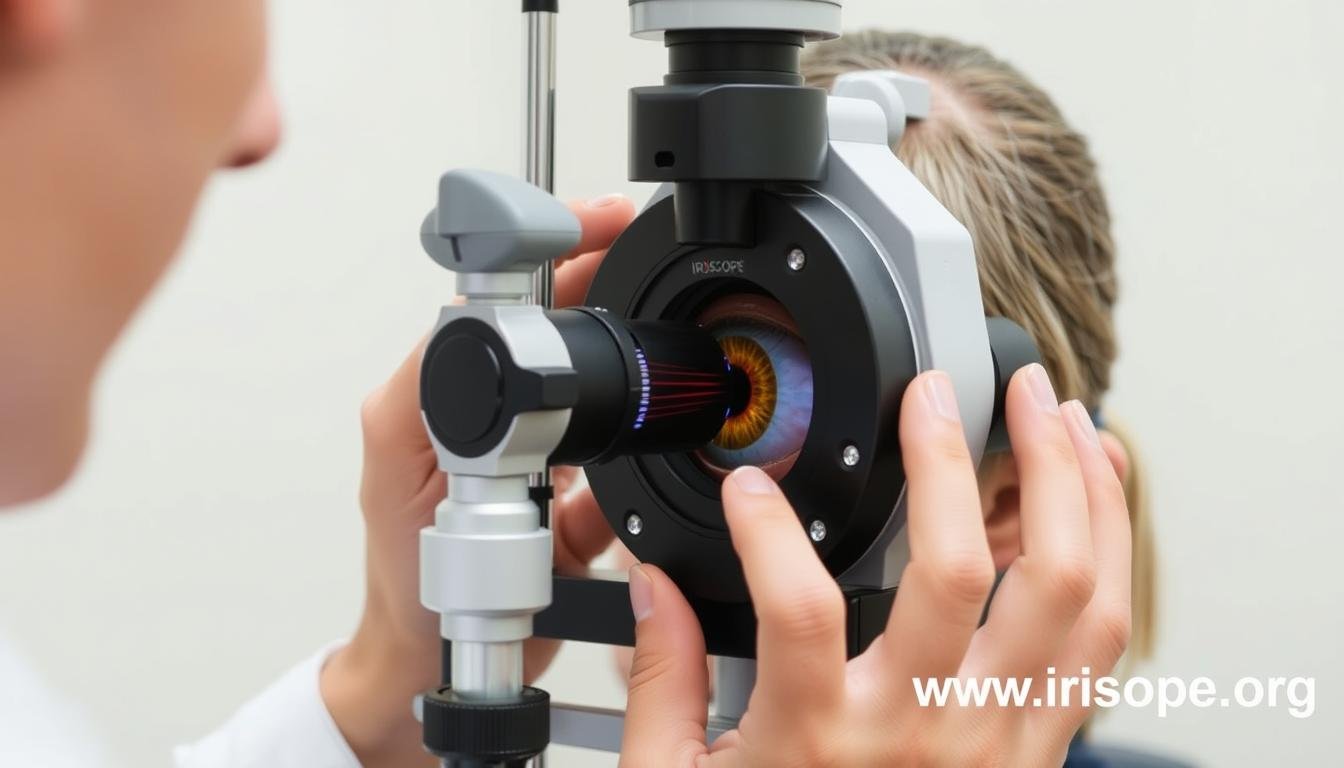Pri skúmaní prístupov alternatívnej medicíny sa môžete ocitnúť na križovatke medzi konzultáciou a Iridológ alebo naturopata. Obidve ponúkajú jedinečné pohľady na zdravie a wellness, ale výrazne sa líšia v metodológii, tréningu a liečebných prístupoch. Tento komplexný sprievodca vám pomôže porozumieť kľúčovým rozdielom medzi týmito dvoma holistickými odborníkmi a určiť, ktorý by mohol byť vhodnejší pre vaše špecifické zdravotné potreby a ciele.Čo je to Iridológ a ako funguje iridológia?

https://iriscope.org/iridologist
A Iridológ je odborník, ktorý sa špecializuje na analýzu vzorov, farieb a iných charakteristík dúhovky (farebnej časti oka), aby získal prehľad o zdravotnom stave človeka. Cvičenie je založené na princípe, že dúhovka sa prostredníctvom nervového systému spája s každým orgánom a tkanivom v tele a dokáže odhaliť informácie o vašom celkovom zdraví a konkrétnych telesných systémoch.
Veda na pozadí an IridológPrístup
Iridológia je založená na myšlienke, že dúhovka obsahuje približne 28 000 nervových zakončení spojených s rôznymi časťami tela prostredníctvom mozgu a nervového systému. Iridológovia verte, že zmeny v týchto tkanivách sa prejavia v dúhovke, čo im umožní identifikovať oblasti zápalu, hromadenie toxínov a funkciu orgánov.
Pomocou špecializovaného vybavenia, ako sú iriskopy a kamery s vysokým rozlíšením, iridológ skúma zložité štruktúry vašej dúhovky a hľadá znaky, ktoré môžu naznačovať zdravotné problémy. Tieto znaky zahŕňajú:
- Farebné variácie a zmeny pigmentácie
- Štrukturálne prvky, ako sú krúžky, škvrny a čiary
- Vzory vlákien a ich hustota
- Špecifické označenia v rôznych zónach dúhovky
História a vývoj praxe iridológov
Korene iridológie možno hľadať už v 17. storočí, no modernú iridológiu rozvinul až v 19. storočí maďarský lekár Dr. Ignaz von Peczely. Príbeh hovorí, že ako dieťa si von Peczely všimol zmeny v dúhovke sovy po tom, čo utrpela zlomeninu nohy. Toto pozorovanie ho viedlo k vyvinutiu prvej iridologickej mapy mapujúcej oblasti dúhovky na rôzne časti tela.
V 20. storočí doktor Bernard Jensen tieto koncepty ďalej rozvíjal v Spojených štátoch a vytvoril detailnejšie mapy dúhovky, ktoré mnohí iridológovia používajú dodnes. Táto prax sa naďalej vyvíja s pokrokom v technológii, čo umožňuje presnejšiu analýzu dúhovky.
Školenie a certifikácia iridológov
Cesta k iridológovi sa vo svete výrazne líši, pretože tento odbor nie je jednotne regulovaný. Väčšina renomovaných odborníkov však podstupuje špecifické školenia a certifikačné procesy.
Ako sú vyškolení iridológovia
Školenie na to, aby ste sa stali iridológom, zvyčajne zahŕňa:
- Štúdium anatómie a fyziológie dúhovky
- Naučiť sa interpretovať znaky a znaky dúhovky
- Pochopenie korelácie medzi zónami dúhovky a systémami tela
- Školenie s iridologickým vybavením a technológiou
- Prípadové štúdie a praktické skúsenosti
Mnohí iridológovia majú skúsenosti aj v iných oblastiach zdravia, ako je výživa, bylinkárstvo alebo iné praktiky doplnkovej medicíny, ktoré integrujú so svojimi znalosťami iridológie.
Máte záujem o profesionálne vybavenie pre iridológiu?
Poskytujeme vysokokvalitné iriskopy, iridologické kamery, softvér a grafy pre lekárov a školiace inštitúcie po celom svete.
Kontaktujte nás na WhatsApp
Pochopenie naturopatie a naturopatických lekárov
Naturopatia je systém alternatívnej medicíny, ktorý kladie dôraz na prirodzené samoliečebné schopnosti tela. Naturopatickí lekári (ND) spájajú tradičnú liečiteľskú múdrosť s moderným vedeckým výskumom na diagnostiku a liečbu rôznych zdravotných stavov.
Základné princípy naturopatickej medicíny
Naturopatia sa riadi niekoľkými základnými princípmi:
- Po prvé, neublížiť – Používať metódy a látky, ktoré minimalizujú riziká
- Liečivá sila prírody – Uvedomenie si prirodzenej schopnosti tela liečiť sa
- Identifikujte a liečte príčinu – Riešenie základných príčin, nie symptómov
- Lekár ako učiteľ – Vzdelávanie pacientov o zdraví a pohode
- Liečte celého človeka – Berúc do úvahy fyzické, mentálne, emocionálne a duchovné faktory
- Prevencia – Dôraz na prevenciu chorôb a udržiavanie zdravia
Prírodný výcvik a regulácia
Na rozdiel od variabilnej regulácie iridológie má naturopatická medicína v mnohých krajinách viac štandardizovaných požiadaviek na školenie:
- Štvorročné naturopatické lekárske programy na postgraduálnej úrovni
- Komplexné štúdium lekárskych vied (anatómia, fyziológia, patológia)
- Klinický tréning v naturopatických terapiách
- Licenčné skúšky v jurisdikciách, kde sú regulované
V Spojených štátoch licencovaní naturopatickí lekári (ND) absolvujú akreditované štvorročné naturopatické lekárske fakulty a v niektorých štátoch majú licenciu ako poskytovatelia primárnej starostlivosti, ktorí môžu diagnostikovať, liečiť a riadiť pacientov.
Iridológ vs Naturopat: Kľúčové rozdiely a podobnosti
Diagnostické prístupy
Iridologický prístup
Iridológ sa zameriava predovšetkým na vyšetrenie dúhovky, aby získal informácie o zdravotnom stave človeka. Táto neinvazívna analýza hľadá znaky na dúhovke, ktoré môžu naznačovať silné a slabé stránky ústavy, úrovne zápalu a potenciálne zdravotné problémy v konkrétnych telesných systémoch.
Naturopatský prístup
Naturopati používajú širšiu škálu diagnostických nástrojov, ktoré môžu zahŕňať fyzikálne vyšetrenia, laboratórne testy, analýzu stravy a podrobné zdravotné záznamy. Niektorí naturopati môžu začleniť iridológiu ako jeden z mnohých nástrojov hodnotenia, ale zvyčajne to nie je ich primárna diagnostická metóda.
Liečebné prístupy
Liečba iridológom
Po analýze dúhovky iridológ zvyčajne poskytuje skôr odporúčania ako priamu liečbu. Môžu zahŕňať zmeny v stravovaní, výživové doplnky, detoxikačné protokoly alebo odporúčania iným lekárom na základe toho, čo pozorujú na dúhovke.
Naturopat liečba
Naturopati ponúkajú priamu liečbu pomocou rôznych spôsobov, ktoré môžu zahŕňať klinickú výživu, botanickú medicínu, homeopatiu, fyzikálnu medicínu, poradenstvo v oblasti životného štýlu a niekedy dokonca aj menšie chirurgické zákroky alebo lieky na predpis (v jurisdikciách, kde majú právo predpisovať lieky).
| Aspekt | Iridológ | Naturopat |
| Primárne zameranie | Analýza dúhovky na posúdenie zdravia | Celotelový prístup k zdraviu a liečeniu |
| Diagnostické metódy | Vyšetrenie dúhovky pomocou špecializovaného zariadenia | Viaceré hodnotiace nástroje vrátane fyzických skúšok, laboratórnych testov |
| Liečebný prístup | Odporúčania založené na nálezoch dúhovky | Priama liečba pomocou rôznych prírodných terapií |
| Požiadavky na školenie | Veľmi sa líši, často certifikačné programy | 4-ročné akreditované lekárske programy v mnohých regiónoch |
| nariadenia | Obmedzená alebo žiadna regulácia vo väčšine krajín | Licencované v mnohých jurisdikciách |
| Poistné krytie | Zriedkavo kryté poistením | Niekedy kryté, v závislosti od jurisdikcie |
Filozofické podobnosti
Napriek rozdielom majú iridológovia aj naturopati spoločné filozofické základy:
- Viera vo vrodené liečivé schopnosti tela
- Zamerajte sa skôr na identifikáciu základných príčin než len na liečbu symptómov
- Dôraz na prevenciu a pohodu celého človeka
- Záujem o spojenie medzi rôznymi systémami tela
- Uprednostňovanie prírodných prístupov k zdraviu
Kedy si vybrať iridológa verzus naturopata
Scenáre, kde môže byť vhodný iridológ
V týchto situáciách môžete zvážiť konzultáciu s iridológom:
- Máte záujem o neinvazívne posúdenie potenciálnych zdravotných predispozícií
- Chcete nahliadnuť do ústavných silných a slabých stránok
- Hľadáte skoré náznaky nerovnováhy skôr, ako sa objavia príznaky
- Zaujíma vás, ako môže váš životný štýl ovplyvniť vaše zdravie
- Chcete doplniť svoju konvenčnú lekársku starostlivosť o alternatívne poznatky
“Iridológ môže poskytnúť jedinečné informácie o vašom zdraví analýzou zložitých vzorcov vašej dúhovky, pričom potenciálne identifikuje oblasti záujmu skôr, ako sa prejavia ako fyzické príznaky.”
Scenáre, kde môže byť naturopat vhodnejší
Naturopat môže byť vhodnejší, keď:
- Hľadáte liečbu špecifických zdravotných stavov
- Potrebujete komplexné posúdenie zdravotného stavu pomocou rôznych diagnostických nástrojov
- Chcete priamu liečbu a nie len odporúčania
- Hľadáte niekoho, kto môže slúžiť ako poskytovateľ primárnej starostlivosti (v niektorých jurisdikciách)
- Potrebujete praktického lekára, ktorý môže objednať a interpretovať laboratórne testy
Doplnkové prístupy
Stojí za zmienku, že iridológia a naturopatia sa navzájom nevylučujú. Mnoho ľudí profituje z oboch prístupov:
- Iridológ môže identifikovať potenciálne oblasti záujmu, ktoré môže naturopat riešiť pomocou špecifických liečebných postupov
- Niektorí naturopati začleňujú iridológiu ako súčasť svojho súboru nástrojov na hodnotenie
- Obe môžu byť použité spolu s konvenčnou lekárskou starostlivosťou pre skutočne integračný prístup
Preskúmajte profesionálne vybavenie pre iridológiu
Či už ste praktický lekár, ktorý chce pridať iridológiu do svojej praxe, alebo jednotlivec, ktorý sa zaujíma o hodnotenie iridológie, ponúkame najmodernejšie vybavenie a zdroje.
Napíšte nám pre informácie
Prípadové štúdie: Iridologické a naturopatické prístupy
Prípadová štúdia 1: Problémy s trávením
Iridologický prístup
Sarah navštívila iridológa pre pretrvávajúce zažívacie ťažkosti. Iridologička identifikovala špecifické znaky v tráviacej zóne jej dúhovky, čo naznačuje zápal a potenciálnu citlivosť na potraviny. Na základe týchto pozorovaní Iridológ odporučil eliminačnú diétu, špecifické bylinky na trávenie a techniky na zníženie stresu.
Naturopatský prístup
Keď sa Sarah s rovnakými problémami obrátila na naturopata, lekár urobil podrobnú zdravotnú anamnézu, vykonal fyzické vyšetrenie a nariadil testovanie citlivosti na potraviny a analýzu stolice. Liečebný plán zahŕňal zmeny v stravovaní na základe výsledkov testov, špecifické tráviace enzýmy, bylinnú medicínu na hojenie čriev a techniky zvládania stresu.
Prípadová štúdia 2: Chronická únava
Iridologický prístup
Michael hľadal pomoc pri chronickej únave. Jeho iridológ zaznamenal známky stresu nadobličiek a preťaženia pečene v jeho dúhovke. Odporúčania zahŕňali protokol šetrnej očisty pečene, bylinky na podporu nadobličiek a úpravy životného štýlu na zníženie stresu a zlepšenie kvality spánku.
Naturopatský prístup
Naturopat, ktorého navštívil Michael, vykonal komplexné krvné testy vrátane testov funkcie štítnej žľazy a nadobličiek. Na základe výsledkov poukazujúcich na subklinickú hypotyreózu a zvýšené hladiny kortizolu naturopat predpísal špecifické výživové doplnky, botanické lieky na podporu nadobličiek a štruktúrovaný program spánkovej hygieny.
Kľúčový poznatok: Zatiaľ čo obaja praktizujúci riešili podobné základné problémy, prístup naturopata zvyčajne zahŕňa viac testovania a priamej liečby, zatiaľ čo iridológ sa zameriava na pozorovania z dúhovky a podporné odporúčania.
Vedecké pohľady na iridológiu a naturopatiu
Výskum iridológie
Vedecká komunita má rôzne názory na iridológiu:
- Niektoré štúdie spochybňujú spoľahlivosť iridológie ako diagnostického nástroja
- Zástancovia poukazujú na klinické skúsenosti a prípadové štúdie podporujúce jeho užitočnosť
- Výskum v tejto oblasti sa naďalej vyvíja, pričom niektoré moderné štúdie skúmajú potenciálne korelácie medzi znakmi dúhovky a zdravotným stavom
Výskum naturopatie
Naturopatická medicína má rastúci počet výskumov:
- Mnohé individuálne naturopatické liečby (ako sú niektoré bylinky, diétne zásahy a terapie mysle a tela) majú vedeckú podporu
- Výskum účinnosti komplexnej naturopatickej starostlivosti sa rozširuje
- Niektoré štúdie ukazujú pozitívne výsledky pri stavoch, ako je cukrovka, srdcové choroby a chronická bolesť, keď sa zvládajú naturopatickými prístupmi
“Zatiaľ čo obe oblasti naďalej rozvíjajú svoju výskumnú základňu, je dôležité pristupovať k akejkoľvek zdravotnej praxi s vyváženou perspektívou, berúc do úvahy klinické skúsenosti aj vedecké dôkazy.”
Praktické úvahy pri výbere medzi iridológom a naturopatom
Úvahy o iridológovi
- Často lacnejšie ako naturopatické konzultácie
- Zvyčajne kratšie termíny stretnutí
- Neinvazívne hodnotenie
- Môže poskytnúť jedinečné poznatky, ktoré nie sú dostupné prostredníctvom iných metód
- Môže identifikovať potenciálne problémy skôr, ako sa objavia príznaky
Úvahy o naturopatoch
- Vo všeobecnosti drahšie konzultácie
- Dlhšie termíny
- Môže zahŕňať dodatočné náklady na testy a liečbu
- Komplexnejšie hodnotenie a možnosti liečby
- Bežné systémy zdravotnej starostlivosti často lepšie rozpoznávajú
Otázky, ktoré si treba položiť pri výbere praktického lekára
Či už uvažujete o iridológovi alebo naturopatovi, položte si tieto otázky:
- Aké je vaše školenie a certifikácia?
- Koľko rokov ste v praxi?
- Aký je váš prístup k mojim konkrétnym zdravotným problémom?
- Spolupracujete s inými poskytovateľmi zdravotnej starostlivosti?
- Aké náklady by som mal očakávať za konzultácie a odporúčané ošetrenia?
- Aké výsledky môžem primerane očakávať a v akom časovom rámci?
Profesionálne vybavenie pre iridológov
Pre tých, ktorí sa zaujímajú o iridológiu, či už ako praktických lekárov alebo pre osobné monitorovanie zdravia, je kvalitné vybavenie nevyhnutné na presnú analýzu dúhovky.
Iriskopy
Špecializované mikroskopy navrhnuté špeciálne na podrobné skúmanie dúhovky so správnym zväčšením a osvetlením na odhalenie jemných vzorov a značiek.
Iridologické kamery
Digitálne fotoaparáty s vysokým rozlíšením, ktoré zachytávajú detailné snímky dúhovky na analýzu, často so špecializovanými šošovkami a osvetľovacími systémami pre optimálnu čistotu.
Iridologický softvér
Pokročilé softvérové programy, ktoré pomáhajú analyzovať snímky dúhovky, mapovať nálezy na telesné systémy a sledovať zmeny v priebehu času pre komplexné monitorovanie zdravia.
Získajte profesionálne vybavenie na iridológiu
Ponúkame prispôsobiteľné, vysokokvalitné iridologické vybavenie pre lekárov po celom svete s globálnou distribúciou a profesionálnou podporou.
Alebo nás kontaktujte cez WhatsApp: https://wa.me/861351090701
Často kladené otázky o iridológoch a naturopatoch
Môže iridológ diagnostikovať zdravotné ťažkosti?
Iridológovia zvyčajne nediagnostikujú špecifické zdravotné stavy. Namiesto toho identifikujú vzory v dúhovke, ktoré môžu naznačovať nerovnováhu alebo slabosti v určitých telesných systémoch. Tieto pozorovania môžu poskytnúť pohľad na potenciálne zdravotné problémy, nemali by však nahrádzať správnu lekársku diagnostiku kvalifikovanými poskytovateľmi zdravotnej starostlivosti.
Je naturopatická medicína vedecky dokázaná?
Mnohé individuálne naturopatické liečby majú vedecký výskum podporujúci ich účinnosť pri špecifických podmienkach. Avšak komplexný prístup naturopatickej medicíny ako celku má rôznu úroveň vedeckých dôkazov. Niektoré naturopatické postupy sú dobre podložené výskumom, zatiaľ čo iné sú založené skôr na tradičnom používaní a klinických skúsenostiach.
Môžem navštíviť iridológa aj naturopata?
Áno, veľa ľudí profituje z konzultácií s oboma typmi lekárov. Iridológ môže identifikovať potenciálne oblasti záujmu, ktoré môže naturopat riešiť pomocou špecifických liečebných postupov. Je dôležité informovať všetkých svojich poskytovateľov zdravotnej starostlivosti o iných liečebných postupoch, ktoré dostávate, aby ste zabezpečili koordinovanú starostlivosť.
Sú služby iridológa kryté poistením?
Vo väčšine krajín nie sú iridologické služby hradené z konvenčného zdravotného poistenia. Niektoré doplnkové plány zdravotného poistenia však môžu ponúkať čiastočné krytie. Najlepšie je informovať sa o možnostiach krytia u vášho konkrétneho poskytovateľa poistenia.
Aké školenie by som mal hľadať u iridológa?
Hľadajte iridológa, ktorý absolvoval komplexný školiaci program od renomovanej školy alebo organizácie. Aj keď neexistuje žiadny univerzálny certifikačný štandard, odborníci by mali byť schopní preukázať svoje vzdelanie v iridológii vrátane kurzov analýzy dúhovky, anatómie a fyziológie a hodnotenia zdravia. Mnoho kvalitných iridológov má skúsenosti aj v iných oblastiach zdravia.
Môžu naturopati predpisovať lieky?
To sa líši podľa jurisdikcie. V niektorých štátoch a provinciách Severnej Ameriky môžu licencovaní naturopatickí lekári predpisovať určité lieky. V iných oblastiach sú ich práva na predpisovanie obmedzenejšie alebo neexistujú. Je dôležité pochopiť rozsah praxe pre naturopatov vo vašej konkrétnej lokalite.
Rozhodujete sa: Iridológ alebo naturopat?
Výber medzi iridológom a naturopatom závisí od vašich konkrétnych zdravotných cieľov, preferencií a potrieb. Obe ponúkajú cenné pohľady na zdravie a wellness prostredníctvom prírodných prístupov.
Iridológ môže byť ideálny, ak hľadáte neinvazívne vyšetrenie, ktoré môže poskytnúť prehľad o vašich konštitučných silných a slabých stránkach, potenciálnych zdravotných predispozíciách a skorých príznakoch nerovnováhy. Tento prístup môže byť obzvlášť cenný pre preventívne zdravotné stratégie.
Prírodný lekár môže byť vhodnejší, ak hľadáte komplexnú starostlivosť o špecifické zdravotné stavy, uprednostňujete lekára, ktorý môže objednať a interpretovať laboratórne testy, alebo chcete priamu liečbu, a nie len odporúčania.
Mnoho ľudí považuje konzultáciu s oboma typmi lekárov ako súčasť integratívneho prístupu k zdraviu. Poznatky získané od iridológa môžu doplniť komplexnejší liečebný prístup naturopata.
Bez ohľadu na to, čo si vyberiete, hľadajte kvalifikovaných odborníkov s riadnym tréningom, dobrými referenciami a prístupom založeným na spolupráci, ktorý rešpektuje vaše zdravotné ciele a hodnoty.
Preskúmajte profesionálne riešenia iridológie
Či už ste praktizujúci, ktorí chcú zlepšiť svoju prax o iridológiu, alebo jednotlivec, ktorý má záujem dozvedieť sa viac o tejto fascinujúcej oblasti, ponúkame prispôsobiteľné, vysokokvalitné vybavenie a zdroje.

 https://iriscope.org/iridologist
https://iriscope.org/iridologist


















